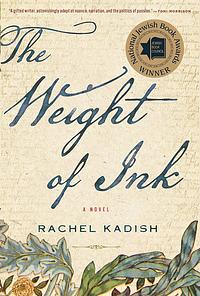Take a photo of a barcode or cover
challenging
inspiring
slow-paced
Plot or Character Driven:
Character
Strong character development:
Yes
Loveable characters:
Yes
Diverse cast of characters:
Yes
Flaws of characters a main focus:
Yes
Really amazing character development. Interesting dynamic between different time periods.
What is it with the parallel timeline trope? So many contemporary historical fiction novels have to have a modern timeline. I always have the same issues 1) By having two relatively disconnected storylines, I am inevitably going to prefer one over the other and 2) The conflict in the modern storyline is always going to pale in comparison to the conflict in the historical one. These stories are always asking me to sympathize equally with, for example, a holocaust victim in the historical section and a woman going through a messy divorce in the modern section.
The Weight of Ink, for me, had the same issue. While I liked Helen, I couldn't stand Aaron. And yes, I know his faults are seen as faults by the narrative and he's supposed to have grown, but that didn't change how I felt about him. He progresses from Misogynistic Sad Nerd Boi to maybe slightly less Misogynistic Sad Nerd Man. I super didn't care about his creepy pining or his personal problems.
It took me awhile to get into this book and I really think the first third could have done with some editing. Once things got going in Ester's story, I was much more engaged. I do wish that we have gotten more of And in terms of the ending, I didn't love Helen/Aaron discovering the potential connection between Ester's accomplishments should have just stood on their own and, as I said, I didn't care about Aaron. Maybe I just didn't want him to be vindicated.
The Weight of Ink, for me, had the same issue. While I liked Helen, I couldn't stand Aaron. And yes, I know his faults are seen as faults by the narrative and he's supposed to have grown, but that didn't change how I felt about him. He progresses from Misogynistic Sad Nerd Boi to maybe slightly less Misogynistic Sad Nerd Man. I super didn't care about his creepy pining or his personal problems.
Spoiler
Also, don't he and Marisa sleep together one time? Obviously it can happen but I hate the one-night-stand pregnancy trope.It took me awhile to get into this book and I really think the first third could have done with some editing. Once things got going in Ester's story, I was much more engaged. I do wish that we have gotten more of
Spoiler
Ester and Alvaro together at the end though. I just really like their arrangement.Spoiler
Shakespeare and Ester's grandmother.
Loved the many journeys this story took and the way it wound itself together. Characters are fully developed and relatable.
There were so many elements that sounded perfect for me. Jewish Historical documents being found in a geniza in London. The two narrative style (the past and the somewhat present) although I find that in these types of books one of the time periods tends to be more engaging than the other. Still I've found them overall engaging light reads. A Jewish woman trying to find herself when the only options were marrying or working a menial job. The prim and proper (really?_ British professor with no discernable personality almost at a mandatory retirement age reminiscing about her (sorry boring) ill-fated love affair with a Zionist Israeli who seems like a knockoff of Ari ben Canaan in the Exodus by Leon Uris.
Like the hidden documents in the geniza every plot element seemed to hide a potentially interesting book and yet ended up being oh yeah like the list of passover provisions which were part of the geniza.
I never got invested in any of the characters in either time period, the plot or the narrative as a whole and I was halfway through and only reading it because really I should and I wanted to finish it. But that's really not enough. I know a lot of people enjoyed this and that's great but I guess it wasn't for me.
Like the hidden documents in the geniza every plot element seemed to hide a potentially interesting book and yet ended up being oh yeah like the list of passover provisions which were part of the geniza.
I never got invested in any of the characters in either time period, the plot or the narrative as a whole and I was halfway through and only reading it because really I should and I wanted to finish it. But that's really not enough. I know a lot of people enjoyed this and that's great but I guess it wasn't for me.
I had high hopes for this book. I’m usually a sucker for a plot that jumps back and forth between characters across time. I also expected to be really interested in the history of the Jewish characters in 16th century England. In the end, I found it boring.
‘A sophisticated twining of literature and early modern history, The Weight of Ink expertly layers research and imagination, blending historical romance with intellectually satisfying metafiction.’
Sydney Morning Herald
Sydney Morning Herald
An engrossing read, requiring attention, and quite enjoyable. A cache of late 17th Century documents, a genizah or archive of Jewish documents, is found in 2000 hidden in a stairwell in a home in Richmond-on-the-Thames. Two scholars, Helen at the very end of her career and Aaron at the beginning of his, begin examining them only to discover they relate to the Restoration when the Portuguese Sephardic Community was being openly re-established in London after centuries of banishment. This story is told in alternating chapters with that of Ester, an orphan in the home of a blind rabbi tasked with guiding and educating this congregation and its sons in 17th Century London. Ester becomes the rabbi's scribe, having been educated against custom and acceptable practice for women. Ester hungers for knowledge, being possessed of a brilliant mind capable of deep philosophical analyses, and a person of great strength. Both stories gradually reveal a compelling historical portrait of a community during the Restoration, including the devastating plague of 1665-1666, while also showing us the personal journeys and epiphanies of our 21st Century scholars. And quite a bit is revealed of the politics of academia along the way.
While this is definitely historical fiction about Restoration London, I hazard to suggest that it is also about women as intellects and philosophers, women academics suppression both overtly historically (denied education) and more subtley in contemporary academia (Helen being supplanted by the (male) former student of the (male) department chair as first scholar studying the genizah). Yet the story also reveals how gifted intellectual women persisted and continue to do so.
I did find sections slow, and the philosophical arguments set out by Ester in the letters she is scribing were a bit much, but there are also many ironies and even inventive leaps that balance out those passages. And I found the historical story revealed to be fascinating.
If you loved Possession by A.S. Byatt, this book is for you. I would also suggest The Last Watchman of Old Cairo by Michael Lukas for the story of another ancient geniza, and Hunger's Brides by Paul Anderson for a similar dual story about a 20th Century Canadian scholar and her subject, Sor Juana Inez de la Cruz, a late 17th Century nun in Mexico, who was one of the great poets and intellects of the time.
While this is definitely historical fiction about Restoration London, I hazard to suggest that it is also about women as intellects and philosophers, women academics suppression both overtly historically (denied education) and more subtley in contemporary academia (Helen being supplanted by the (male) former student of the (male) department chair as first scholar studying the genizah). Yet the story also reveals how gifted intellectual women persisted and continue to do so.
I did find sections slow, and the philosophical arguments set out by Ester in the letters she is scribing were a bit much, but there are also many ironies and even inventive leaps that balance out those passages. And I found the historical story revealed to be fascinating.
If you loved Possession by A.S. Byatt, this book is for you. I would also suggest The Last Watchman of Old Cairo by Michael Lukas for the story of another ancient geniza, and Hunger's Brides by Paul Anderson for a similar dual story about a 20th Century Canadian scholar and her subject, Sor Juana Inez de la Cruz, a late 17th Century nun in Mexico, who was one of the great poets and intellects of the time.
Loved the idea, but: 1. The characters seemed like caricatures. 2. The story, at the point I quit (75 pages) had not really begun. 3. On top of that, there was this unexpected romantic element that felt forced.
Recommended by Debbie. Check our catalog: https://encore.cooklib.org/iii/encore/search/C__Sweight%20of%20ink%20kadish__Orightresult__U?lang=eng&suite=gold
This is simply a darn good story, with lots of twists and turns...one you can lose yourself in for the better part of an afternoon. I was drawn to Ester's story more than to the story of Helen and Aaron, and at times found myself reading through parts quickly to get back to reading about Ester. Overall, this was a very good book to curl up with during these dark winter days.





